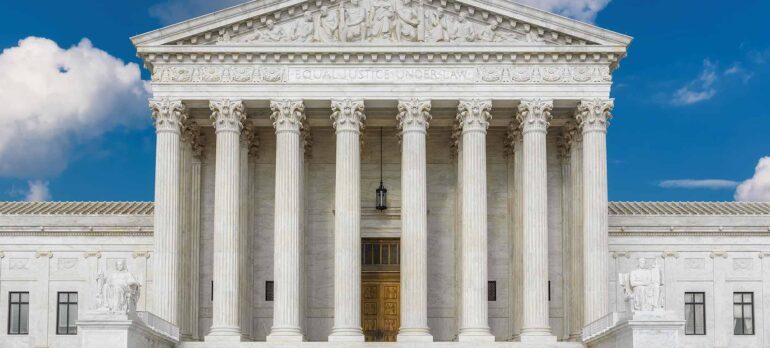
LDF Files Supreme Court Amicus Brief in Moore v. Harper
On Tuesday, Lawyers Democracy Fund (LDF) filed an amicus brief at the United States Supreme Court in Moore v. Harper, a case that explores the ability of state legislatures to prescribe the times, places, and manners of elections under the Elections Clause of the United States Constitution and what role state judicial branches can play in that process.
The United States Constitution clearly and succinctly states that the “times, places and manner of holding elections for senators and representatives, shall be prescribed in each state by the legislature thereof.” U.S. Const. Art. I, § 4, cl. 1. While this language has been historically recognized to be an exclusive grant of authority to state legislatures, recent litigation has put forth a simple but complicated question: what role do state judiciaries have in this process?
After the 2020 census, the North Carolina legislature adopted new redistricting maps that largely resembled the state’s prior maps, which the North Carolina Supreme Court held complied with the Voting Rights Act and avoided racial gerrymandering. However, after several lawsuits were filed against these new maps for how they favored one party, the North Carolina Supreme Court struck down the maps in a party-line vote. The court then appointed a special master to draft new maps, which the court subsequently adopted on its own without any input from the legislature. The court justified this action based on a vague state constitutional provision that purportedly vests the state judiciary with the power to prescribe whatever rules it deems appropriate to ensure a “fair” or “free” election.
This case now stands before the United States Supreme Court, exploring the breadth of the Elections Clause and whether it empowers a state’s judicial branch to nullify the regulations passed by the legislature and replace them with regulations of the state courts’ own devising.
LDF’s brief took an academic approach to the issue, highlighting the longstanding and exclusive role that state legislatures possess under the Elections Clause to prescribe the rules of elections and how state judiciaries historically have been excluded from this process.
Since the constitutional framers delegated the federal power to “prescribe[]” the “Times, Places, and Manner of holding Elections for Senators and Representatives” “in each State” to “the Legislature thereof,” U.S. Const. Art. I, § 4, cl. 1, all stakeholders—from state legislatures to Congress, from state courts to this Court—have recognized this power to “involve lawmaking in its essential features and most important aspect.” Smiley v. Holm, 285 U.S. 355, 366 (1932)… The historical record shows that Congress and the federal courts alone guaranteed the right to vote, albeit imperfectly and belatedly. State courts had little if any meaningful role in that campaign.
Because state judiciaries historically lack the power to act as the North Carolina Supreme Court did in this case, LDF’s brief warned the Supreme Court of what would result if it did not overturn the North Carolina Supreme Court’s decision to adopt its own maps.
The decision below has the potential to revolutionize election law by affording state courts unprecedented and unchecked power over federal elections. Election-reform ideologues have recently come to view state courts as valuable allies in achieving wholesale repudiation of state election policies and ejection of state legislatures from their traditional and constitutionally established role in setting election policy. This would, if affirmed, undermine LDF’s many election-integrity initiatives. And it would undermine the role the Legislative Amici have in deliberating over and voting on federal-election legislation.
LDF explained what is causing this recent push to have state judiciaries act in an area that has been exclusively reserved for state legislatures—the political process and the laws and regulations it produces can be rather inconvenient.
[T]his Court and Congress have acknowledged the primacy of state legislatures in setting election policy, avoiding interfering with discretionary choices that do not impose an unjustifiable voting burden and do not discriminate on invidious bases. But that approach dissatisfied a few well-funded ideological groups who view most any inconvenient regulation of elections as ripe for judicial revision. It is their comparatively re- cent effort to compel states into aggressive new ways of running elections, without the popular support needed to convince the people’s elected representatives, that gives rise to this case and so many like it.
Lastly, LDF discussed the danger of letting state judicial branches act in a legislative role to prescribe election rules, especially where that power is explicitly reserved for the legislative branch under the Elections Clause. LDF also considered what this decision could mean for future elections if the United States Supreme Court does not intervene.
[T]he decision below and its 2018 Pennsylvania counterpart have the fundamental characteristics of legislation. Both decisions exercised considerable policymaking discretion without any support in the respective state’s judicial precedent…The framers intentionally vested this power with state legislatures, not because they are superior institutions, but rather because they are proper forums for politics and the exercise of broad discretion it entails. Unless this Court enforces that longstanding constitutional framework, there is little chance to restrain state courts from usurping the legislative role and becoming hyper-politicized institutions.
Ultimately, LDF’s amicus brief puts forth a very straightforward argument: the Elections Clause has been understood since its inception to afford state legislatures the power exclusive power to prescribe election rules. If the United States Supreme Court does not overturn the North Carolina Supreme Court’s decision to involve itself in this process, state Supreme Courts are going to become hyper-politicized entities that undermine duly enacted laws in future elections rather than acting as neutral arbitrators that respect the powers delegated to other branches.
To read LDF’s brief in its entirety, click here.

